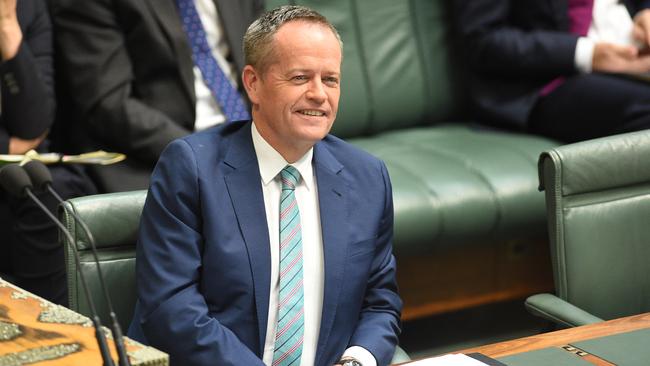Bill Shorten gets the silent treatment over AWU practices

Many years ago, when Bill Shorten took over the Australian Workers Union, it was struggling financially and considered a bit of a joke within the union movement. By the time Shorten had finished his stint at the union, there had been a miracle turnaround. The AWU had become rich and powerful. A swollen membership list and the bank account to go with it bought the union substantial voting rights with the Australian Labor Party.
Sitting at the head of the union, wielding the numbers, Shorten carved out a golden doorway, walked through it into parliament, and rose up the greasy pole to sit in the big chair where he sits today.
But what is Shorten? Is he an honourable man? A genuine advocate for working people? A prime minister in waiting? Or a union sellout?
Way back, when Shorten ran the AWU, within other unions, resentment and suspicion towards the union was widespread. Through the years, other union officials, struggling with dwindling memberships and declining finances, developed a theory to explain how the clapped-out AWU inexplicably had been revived. This theory had its foundation in widespread anecdotal evidence.
Every union official I have ever met has their own AWU story to tell, and these stories always follow the same theme. The interests of working people are traded away in exchange for money from a grateful employer. The union official visits a work site to find all their members have been “put into the AWU” and they are consequently shut out of the workplace.
Now, the Royal Commission into Trade Union Governance and Corruption has provided much evidence to back up those stories. Because of these stories, the AWU, among the other unions, has long been considered not a proper union.
It is considered a business, and if it is a business, its product is said to be cheap, compliant labour. Imagine having the opportunity to run a union, with all its legal privileges and its tax-exempt status, as a business that is able to charge for a cut-rate, acquiescent workforce and the legislative ability to lock other unions out of the workplace.
Anyone in this position could easily clean up, could easily become prime minister. The possibilities are endless.
There is, of course, an alternative view to consider for the turnaround in the AWU’s fortunes. This view is that Shorten possesses superior management skills. He may simply have been a good manager, cut costs and convinced tens of thousands of people to join the AWU.
Perhaps under Shorten’s leadership, in the environment of declining interest in unions, and when all other unions were losing members hand over fist, swathes of working people suddenly became seized with the desire to join a union — and the union they wished to join was the AWU. Perhaps AWU officials were able to generate a wave of fervent unionism around them, and working people simply found themselves, in droves, compelled to join up.
However, the odds, and the evidence that keeps piling up in the royal commission into union governance, are both very much against this theory.
In fact, considering everything, a reasonable person may find themselves inclined to agree with Cesar Melhem, a politician who was once Shorten’s underling at the union. He told the ABC earlier this year the AWU was a business and, as such, was perfectly entitled to charge employers for the services it provided.
This week, three executives testified in the royal commission that Shorten had once sought funds from a company in exchange for a labour deal. One of the executives kept a diary note of the alleged conversations. The deal delivered savings in labour costs of $100 million. Shorten has denied via the media that he sought any funds. Despite these sensational events, the TV media coverage was scant and the reporting fairly muted.
The way the story played out in the TV media had Labor people in Canberra breathing sighs of relief. They were telling anyone who would listen that Shorten was probably going to be OK because it looked like no one had even noticed the events.
These people are living in a fool’s paradise. People have noticed all right. Readers should note that the ABC tried to find someone from the ACTU or a union to debate the happenings with me on television, and no one could be found; no one from the union movement was prepared to come and publicly defend Shorten.
Perhaps Labor powerbrokers should not interpret the public silence surrounding the events this week as ignorance, approval or uninterest. Perhaps the silence should be understood to be the sound of people who have had their suspicions confirmed, and are turning their heads away in disgust.



To join the conversation, please log in. Don't have an account? Register
Join the conversation, you are commenting as Logout